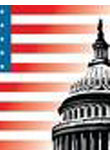 The U.S. Senate has voted 75 to 24 in favor of proposed nationwide Internet sales taxes, a move that several major U.S. retail groups applaud. The law, which exempts businesses with annual out-of-state sales of less than $1 million, “is proof-positive that the federal government’s special treatment of online-only retailers will soon be a thing of the past,” said Retail Industry Leaders Association president Sandy Kennedy. The amendment is a clear victory for Main Street retailers and those who believe in free and fair competition, she added.
The U.S. Senate has voted 75 to 24 in favor of proposed nationwide Internet sales taxes, a move that several major U.S. retail groups applaud. The law, which exempts businesses with annual out-of-state sales of less than $1 million, “is proof-positive that the federal government’s special treatment of online-only retailers will soon be a thing of the past,” said Retail Industry Leaders Association president Sandy Kennedy. The amendment is a clear victory for Main Street retailers and those who believe in free and fair competition, she added.
“The retail community is unified in our commitment to pass the Marketplace Fairness Act and make it law,” Matthew Shay, president and CEO of the National Retail Federation remarked. Shay called the vote a critically important issue for retailers both large and small across the country.
The overwhelmingly positive response could allow the act to bypass the U.S. Senate Committee on Finance. Should the final bill, the Marketplace Fairness Act of 2013, be approved and written into law, it will essentially eradicate the advantage that smaller internet retailers have over stores with a multi-state presence.
Local retailers have long considered it unfair that they must charge state sales tax on purchases, while large Internet firms, like Amazon.com, can sell the same item without charging a sales tax, essentially giving their prices a discount. The U.S. Supreme Court has ruled that states can only force companies to charge a state sales tax if the company has a physical presence in that state.
Although the large majority of the Senate voted in favor of the proposal, the opposition is still very vocal. The National Taxpayers Union has created a petition and urges the public to make their voices heard by sending it to their local Senators. The union stated that the Marketplace Fairness Act is “just a way to unleash state tax collectors on the internet…doing so will hit small businesses with major compliance headaches, overturn constitutional protections against harsh tax administration, and undermine state tax competition.” Many conservatives also oppose the legislation. Grover Norquist, founder and president of the Americans for Tax Reform advocacy group, said the Marketplace Fairness Act amounts to a new tax, rather than an enforcement issue.